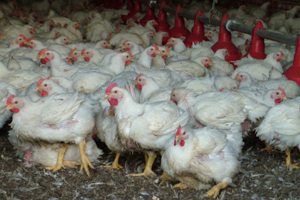Understanding transmission of Mycoplasma synoviae

Mycoplasma synoviae (MS) is a prevalent and economically significant poultry pathogen, causing respiratory tract infections or infectious synovitis.
MS was identified as the causative agent of an outbreak of severe respiratory disease in broilers and broiler breeders in the state of Arkansas USA, between 2008 and 2009. Two MS genotypes (designated S-10 and S-17) were evaluated from this outbreak. It was found that the S-10 genotype was significantly more pathogenic than the S-17 genotype, and that the transmissibility of S-10 MS from infected seeder birds to direct contact, adjacent contact, downwind contact and fomite contact birds was comparable to that of the pathogenic MS reference strain K1968.
The objective of the study was to evaluate and compare the transmission of the S-10 and S-17 genotypes of MS to chickens from various directly inoculated materials commonly encountered in the poultry house environment, which could serve as fomites facilitating the indirect transmission of MS.
Feathers, cotton fabric or plastic boot covers inoculated with S-10 or S-17 MS cultures infused with mucin were placed in 6 pens containing 15, 65 week old broiler breeder chickens per pen. The study design incorporated two sentinel pens, positioned to detect MS transmission from infected pens, and a negative control pen. Low-level MS transmission (6.7% – 20.0%) from S-17-inoculated fabric and from S-10-inoculated feather, fabric and boot cover fomites was detected at 3 and 5 weeks post challenge by real-time PCR, but not by culture or serology.
Source: Natalie Armour and Naola Ferguson-Noel, University of Georgia, Athens, GA USA
Abstracts of the 2014 International Poultry Scientific Forum, Atlanta, GA USA












